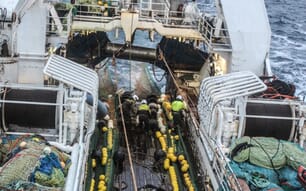The cod and haddock TACs have been increased by five and six per cent respectively. North Sea plaice has also had an increase. North Sea saithe, whiting and herring have seen decreases in line with their long term management plans.
As well as deciding TACs for the coming years, these talks have also successfully negotiated a repeat of last year’s inward transfers of haddock and whiting quota from Norway. These transfers mean the Scottish industry has access to even more catching opportunities in 2015 and have the effect of raising the increase for haddock from six to 15 per cent and limiting the reduction for whiting from 15 to 10 per cent.
Scottish Fisheries Secretary Richard Lochhead said: “I am pleased there has been an increase in the quota of these key stocks for next year which is in line with the recent scientific advice that the stocks are in good shape.
“It is welcome the agreement has been reached quickly this year compared to the protracted talks last year and will provide certainty for the industry about opportunities in 2015 and avoids any delays to the commencement of fishing in the new year.
“There is much to be done to prepare for the discard ban which starts to come into force for whitefish from 2016. This outcome will help these stocks continue to rebuild next year while also helping to minimise discards, and should provide a sound launchpad for establishing the following year’s quota under the ban.
“We now look ahead to the crucial December EU fisheries Council when we will be highlighting again that our vessels need to retain the number of days they can go to sea as any cut would simply be counterproductive.”
The Scottish White Fish Producers’ Association and Shetland Fishermen’s Association (SWFPA) also welcomed the quota increases but warned that a huge amount of effort would be required next year to prevent the discard ban, which will be introduced in 2016, wrecking the good work delivered thus far on improving sustainability in the Scottish fishing industry.
Chief executive of SWFPA Mike Park said: “While the quota increases in key stocks are a positive signal, the Commission and NGOs who have pursued reforms to eliminate discards need to start acknowledging the commitment of Scotland’s fishermen in delivering the recovery of fish stocks. It is now essential that they begin to look forward to a positive future rather than continuing to revisit the mistakes of the past.
“The fishing industry has changed out of all recognition and we are demanding innovative fisheries management to complement the innovation currently going on within the fishing sector. Delivering and maintaining sustainable fisheries and stable stocks is now uppermost in the minds of all fishermen.”
Commenting on behalf of the Scottish Fishermen’s Federation, Bertie Armstrong, chief executive, said: “Pragmatic decisions were made at these negotiations and the increase in North Sea cod in particular recognises the realities of managing complex mixed fisheries and the need for sensible balances.”
“These EU/Norway negotiations concluded today are the last set of talks to take place between the two parties before the introduction of the landing obligation for the demersal sector in 2016. This means that this year’s crucial December Fish Council presents an important opportunity to agree on catch opportunity levels that reflects both the actual abundance of fish stocks and the requirement to reduce discards.”
Simon Coveney, Irish Minister for Agriculture, Food and the Marine, was also pleased with the outcome of the talks for Ireland.
Minister Coveney said: “I am very pleased that my officials were able to secure a 12 per cent increase in Ireland’s share of the important Haddock fishery off Donegal. I also welcome the fact that, subject to confirmation at the Coastal States meeting in London on the 15 December, we managed to find agreement on an increase in the Blue Whiting Total Allowable Catch for 2015. This fishery is important for our fishermen that target Blue Whiting and for our fish factories that process Irish, Norwegian and Scottish catches of this species for human consumption exports.”
The Minister added that “as part of the Blue Whiting package, Ireland was able to reduce the percentage of Blue Whiting TAC, which is transferred by the EU to Norway as part of the overall deal, which will increase the amount of Blue Whiting available to our fishermen.”




